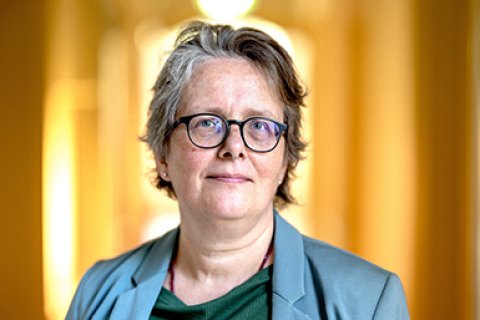What is limitarianism? Professor Ingrid Robeyns explains
Robeyns has been campaigning for the concept of limitarianism for years, why?

An interest in her concept of ‘limitarianism’ is not foreign to Professor of Ethics of Institutions Ingrid Robeyns: (media) attention has been high since 2017. We made an overview, because what exactly does limitarianism mean? And why has Robeyns been campaigning for this concept for years?
Socialism, communism, limitarianism?
“Extreme wealth undermines democracy, is incompatible with ecological urgency, is almost always undeserved, and harms the interests of everyone, the super-rich included.” This is how De Wereld van Morgen (22 February 2021) summarised Robeyns’ findings of research. At a stroke, it clarifies why Robeyns advocates limitarianism, the capping of wealth with a wealth limit. “Just as there is a poverty threshold.”

Limitarianism is not the same as socialism or communism, Robeyns stresses. “It means that you can accept a certain degree of inequality,” she explains in the Goede gesprekken podcast (10 April 2023). In de Volkskrant (1 December 2023) she cites effort and risk-taking as legitimate grounds for pay differences. “Someone who works 40 hours gets more than someone who works 20 hours. I also have no problem with rewarding a certain degree of risk-taking. It is fine for people to have ambitions, to be paid for what they do, but there should be a limit.”
The moral wealth limit of limitarianism
Where the line should be drawn is still under discussion. According to Robeyns, this is a moral and political issue, and several lines of reasoning are possible to determine that boundary. One possibility is to draw the line where wealth no longer adds to quality of life.
In de Volkskrant (1 December 2023), Robeyns mentions an upper limit of 10 million euros. “This is the political limit, the wealth ceiling the system should aim at,” she explains. “I do stress that this is an estimate. A contribution to the discussion. It is what it could be. And it’s the amount for the Dutch context. I imagine if you live in New York and don’t have a pension, it should be more.”
Limitarianism means restricting inequality, while also accepting a certain degree of inequality.
“I also mention another personal, ethical limit. That is at 1 million euros. So, for a family, it would be 2 or 4 million euros – ample to live a good life. Why should a person have to have more? The world is on fire and needs a lot of money to put out the fire. The richest possess a lot of money that they don’t need at all. So we should start getting our firewater from the super-rich. Only then from the middle class, and certainly not from the poor.”
The Dutch public does have an idea of where that limit would be. “Our empirical research shows that a large majority of Dutch people (at 2018 price levels) think that at a wealth of 2.2 million, one has more than enough,” Robeyns writes in Vrij Nederland (13 March 2023).
Reducing equality
Moreover, the limit should not only be set ‘top down’. Super-rich people should also partly make the moral decision of giving away some of their wealth themselves. “Limitarianism is just a word for the thought that there should be a moral limit to how much wealth you can accumulate,” Robeyns told CBS News (23 January 2022). “It’s fine to be well-off. But at some point, one has too much.”

In de Volkskrant (1 December 2023), Robeyns explains that extreme wealth is almost always undeserved. “Luck often plays a great part in large wealth, which makes it questionable to what extent someone is morally entitled to all those millions. Besides: nobody gets super-rich on their own, without the support of society.” She adds: “The idea of a wealth limit is really that you try to reform the whole economic system in such a way that it reduces inequality.”
It’s Robeyns’ main concern: reduce inequality in society. Arguments she has plenty. She cites the ever-growing inequality as a threat to society, for instance. “The social discontent about the great wealth inequality and the widening gap between the richest and the laggards is also deepening,” she writes in Vrij Nederland (13 March 2023).
Power and influence
The threat to democracy is also raised by Robeyns as an argument for limitarianism. She sees the super-rich in the United States, for example, turning their financial wealth into political power relatively easily. “It can, of course, be that you just fund somebody who’s standing for office who then becomes a president or a member of Congress,” she tells CBS News (23 Januari 2022). “It can also be that you, for example, buy up or fund, heavily fund, say, university institutes. And in that way, you shape the way the public conversation is going.”
In the Netherlands, this is not happening to the same extent, although we have to watch out for American conditions, Robeyns warns. “There will be a concentration of power,” she explains in Het Parool (23 January 2023). “You can call Mark Rutte on his mobile phone number or make large donations to political parties. That comes on top of government policies that usually already benefit people with great wealth.”
Ingrid Robeyns
Ingrid Robeyns is Professor of Ethics of Institutions at Utrecht University. Graduated as an economist, she is particularly interested in poverty, inequality, and ethics. Her book Limitarisme: Pleidooi tegen extreme rijkdom was published on 30 November 2023. This winter, the translation Limitarianism: The Cast Against Extreme Wealth is due.
“The people in the Groningen earthquake area or the parents and children of the benefits affair don’t feel heard, and have no direct lines of communication,” she adds at Goede gesprekken (10 April 2023). “You have de facto inequality between citizens. Also in the Netherlands.”
Limitarism and the climate crisis
Extreme wealth is not only disastrous for solidarity and democracy, but also for the climate. For example, a recent study by Oxfam showed that the richest 1 per cent globally emit more than the poorest 66 per cent. Looking at history, the West has a duty to be the first to take steps to curb the climate crisis, Robeyns says at Goede gesprekken (10 April 2023). “Now you see that countries like India and China are emitting more and more, but historically this is still a minor fraction. Even more so if you consider it per capita.”
Limitarianism would be a good start, Robeyns thinks. “It is absurd to have people sitting on millions and billions that only serve to further accumulate more and more. All the money that people don't need for their own well-being we could use to drive the climate transition.”

